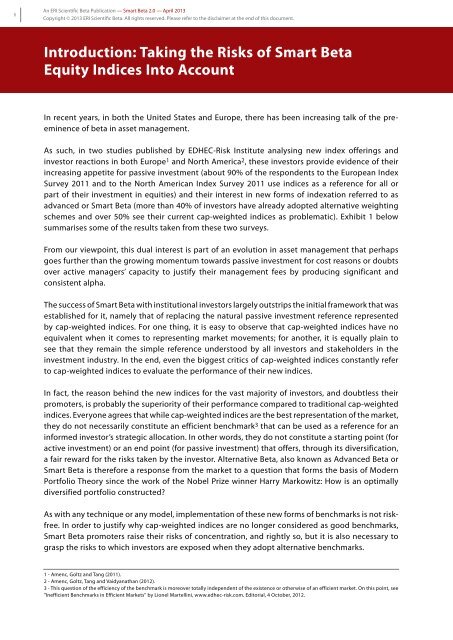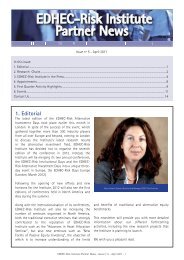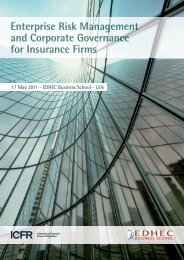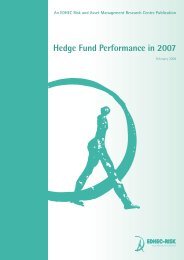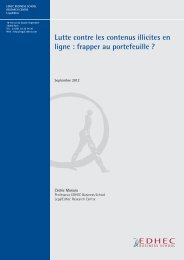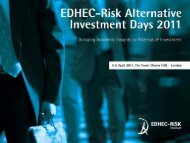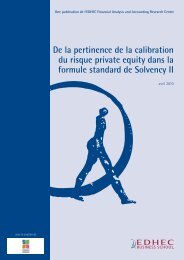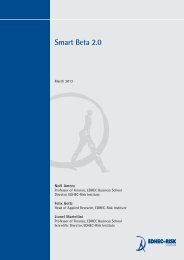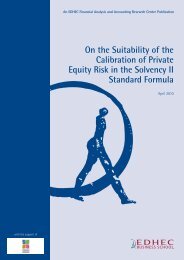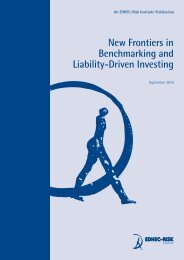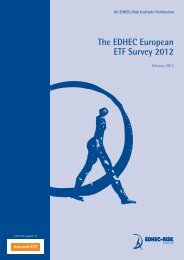The Smart Beta 2.0 Approach - EDHEC-Risk
The Smart Beta 2.0 Approach - EDHEC-Risk
The Smart Beta 2.0 Approach - EDHEC-Risk
You also want an ePaper? Increase the reach of your titles
YUMPU automatically turns print PDFs into web optimized ePapers that Google loves.
6<br />
An ERI Scientific <strong>Beta</strong> Publication — <strong>Smart</strong> <strong>Beta</strong> <strong>2.0</strong> — April 2013<br />
Copyright © 2013 ERI Scientific <strong>Beta</strong>. All rights reserved. Please refer to the disclaimer at the end of this document.<br />
Introduction: Taking the <strong>Risk</strong>s of <strong>Smart</strong> <strong>Beta</strong><br />
Equity Indices Into Account<br />
In recent years, in both the United States and Europe, there has been increasing talk of the preeminence<br />
of beta in asset management.<br />
As such, in two studies published by <strong>EDHEC</strong>-<strong>Risk</strong> Institute analysing new index offerings and<br />
investor reactions in both Europe 1 and North America 2 , these investors provide evidence of their<br />
increasing appetite for passive investment (about 90% of the respondents to the European Index<br />
Survey 2011 and to the North American Index Survey 2011 use indices as a reference for all or<br />
part of their investment in equities) and their interest in new forms of indexation referred to as<br />
advanced or <strong>Smart</strong> <strong>Beta</strong> (more than 40% of investors have already adopted alternative weighting<br />
schemes and over 50% see their current cap-weighted indices as problematic). Exhibit 1 below<br />
summarises some of the results taken from these two surveys.<br />
From our viewpoint, this dual interest is part of an evolution in asset management that perhaps<br />
goes further than the growing momentum towards passive investment for cost reasons or doubts<br />
over active managers’ capacity to justify their management fees by producing significant and<br />
consistent alpha.<br />
<strong>The</strong> success of <strong>Smart</strong> <strong>Beta</strong> with institutional investors largely outstrips the initial framework that was<br />
established for it, namely that of replacing the natural passive investment reference represented<br />
by cap-weighted indices. For one thing, it is easy to observe that cap-weighted indices have no<br />
equivalent when it comes to representing market movements; for another, it is equally plain to<br />
see that they remain the simple reference understood by all investors and stakeholders in the<br />
investment industry. In the end, even the biggest critics of cap-weighted indices constantly refer<br />
to cap-weighted indices to evaluate the performance of their new indices.<br />
In fact, the reason behind the new indices for the vast majority of investors, and doubtless their<br />
promoters, is probably the superiority of their performance compared to traditional cap-weighted<br />
indices. Everyone agrees that while cap-weighted indices are the best representation of the market,<br />
they do not necessarily constitute an efficient benchmark 3 that can be used as a reference for an<br />
informed investor’s strategic allocation. In other words, they do not constitute a starting point (for<br />
active investment) or an end point (for passive investment) that offers, through its diversification,<br />
a fair reward for the risks taken by the investor. Alternative <strong>Beta</strong>, also known as Advanced <strong>Beta</strong> or<br />
<strong>Smart</strong> <strong>Beta</strong> is therefore a response from the market to a question that forms the basis of Modern<br />
Portfolio <strong>The</strong>ory since the work of the Nobel Prize winner Harry Markowitz: How is an optimally<br />
diversified portfolio constructed?<br />
As with any technique or any model, implementation of these new forms of benchmarks is not riskfree.<br />
In order to justify why cap-weighted indices are no longer considered as good benchmarks,<br />
<strong>Smart</strong> <strong>Beta</strong> promoters raise their risks of concentration, and rightly so, but it is also necessary to<br />
grasp the risks to which investors are exposed when they adopt alternative benchmarks.<br />
1 - Amenc, Goltz and Tang (2011).<br />
2 - Amenc, Goltz, Tang and Vaidyanathan (2012).<br />
3 - This question of the efficiency of the benchmark is moreover totally independent of the existence or otherwise of an efficient market. On this point, see<br />
"Inefficient Benchmarks in Efficient Markets" by Lionel Martellini, www.edhec-risk.com. Editorial, 4 October, 2012.


